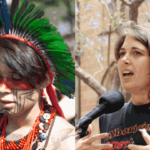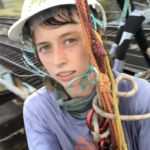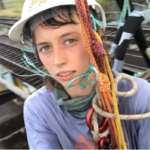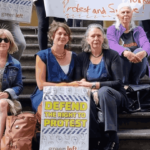Mainstreaming Civil Resistance: Climate Defender Brad Homewood on Building the Movement
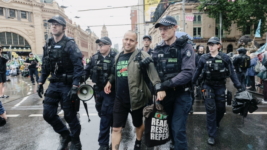
The climate crisis gave everyone living on this continent a severe warning over the summer of 2019/20, when wildfires burnt 20 percent of forest to the ground. And for those who didn’t heed the call, a series of extreme flooding events hit the east coast to reinforce the emergency afterwards.
The regular summer fires came early in 2019, which was a year that held great significance for the local climate movement as well, as it was given a shot in the arm by the mass Extinction Rebellion (XR) protests in London in April, as activists successfully shut down parts of that megacity.
The example in the UK, led to the Gadigal-Sydney XR Spring Rebellion of 2019, which marked an escalation in the local climate movement, whilst further establishing a new commitment on the part of activists to refuse police persuasion to stop demonstrating until officers are forced to arrest them.
The onset of the COVID pandemic, however, and its accompanying 2020 and 2021 lockdowns, stifled the momentum that the climate movement was gaining at the time, to the point that it was no longer visible on the streets.
Indeed, gone were the days that School Strike for Climate could get 80,000 people to mobilise in Gadigal Djarrbarrgalli-the Sydney Domain.
“Hell on Earth”
But several years on and the movement is beginning to pick up again. Rising Tide Newcastle held two significant civil disobedience events last year, with the latter garnering about 3,000 demonstrators participating in an on-water blockade that saw 100 activists willingly get arrested.
Two-Thousand and Nineteen was also a significant year for climate defender Brad Homewood, as he began seriously participating in climate actions, which was down to worsening climate developments accompanied by the lead given by UK Extinction Rebellion activists.
And along with XR, Homewood has also thrown his support behind Blockade Australia (BA), which, after the establishment of the NSW antiprotest regime in 2022, has been raided by NSW police, while officers have paid individuals pre-protest home visits and arrested activists days after rallies.
Sydney Criminal Lawyers spoke to climate defender Brad Homewood about the state of the climate movement in this country, the reasons why he’s committed himself to the cause and the desperate need for more activists to get on board before the globe goes up in flames.
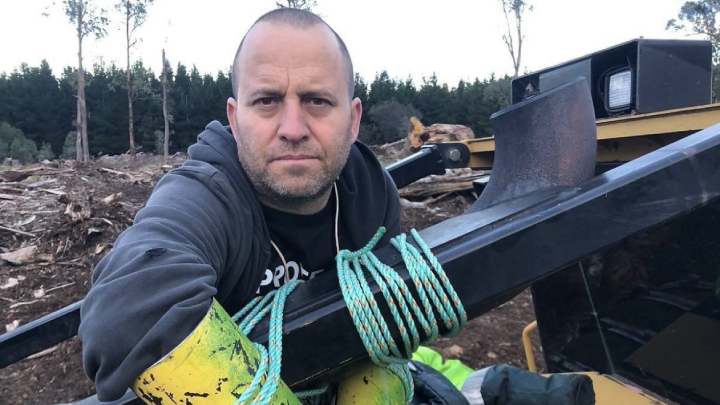
Brad, you’ve just arrived back in Gadigal-Sydney from a blockade in Bellingen. That’s after returning from participating in Bob Brown Foundation actions in Tasmania and that was on the back of a series of Extinction Rebellion actions in Naarm-Melbourne.
So, as someone who has put themselves on the frontline of climate and environmental action across many borders in this country, how would you describe the state of the movement at present? Has it recovered from the COVID slowdown?
What we are seeing now are green shoots. These are reasons for hope. But we are not back where we were pre-pandemic. There was a lot of energy coming out of the Black Summer bushfires, and it really felt like the moment.
There was a massive influx of people joining local Extinction Rebellion meetings back then – numbers that hadn’t been seen before. And the pandemic smashed all that.
That wasn’t just the climate movement. I have friends in other activist space, who say they got smashed as well.
We took a massive hit with the pandemic, but we’re definitely seeing green shoots.
The December Rebellion in Naarm, just before Christmas, was the biggest Extinction Rebellion-only event recently.
We did a slow march and a mass arrest, where 70-plus people were arrested at Flinders Street intersection.
We had hundreds of people showing up for an XR march. So, there are signs of hope. There are definitely green shoots, and we have to hope we can build on that and build on that quickly.
A consequence of raising attention to climate action is one can fall foul of the law and end up being arrested and taken into custody.
For your troubles, you’ve been arrested 15 times across four states, and you’ve been held on remand.
What would you say you’ve learnt about the various state police forces and the way they’re targeting climate defenders?
There is a significant amount of variability between the states. There are different cultures within different police forces.
As a baseline, it’s important to always remember and maintain that the police are not our friends.
Some police officers will come across friendly. It is important to remember that they’re trained in the skill of collecting data, and that is very much part of their strategy, to befriend you and to get you to drop your guard.
That’s so you give them information that they can add to a database and build profiles on people.
So, it’s really important that we remember, they’re not our friends.
If you are moving from one state to the another to do activism, I would emphasise the importance of always doing a legal briefing with activists on the ground and getting your head around the laws in that state, because there are variations from one state to another.
It’s about getting a good understanding of the police in that state and what their culture is about. There are differences, and it is really important to get your head around them.
Our job as climate activists, especially those who have been in the game for a significant period of time and have upskilled, is to mainstream civil resistance.
It is our job to bring new people on and educate, inform and upskill them and to build their courage muscles.
We are going to need a small army of climate defenders if we are going to win this struggle. And it is very important that we mainstream what we do.
There is a significant vanguard of us who have stuck it out through the tough years of the pandemic and have the skills to pass on, and we are more than willing to pass them on and upskill those people.
So, what do you mean by mainstreaming what you do?
We need to make it socially acceptable for people to go out there and exercise their fundamental democratic right to disrupt in protest.
Not everyone is going to want to lock-on or glue-on or do those things that are viewed as more radical by society in general, but if we had the large numbers, we don’t need a lot of people to do lock-ons and glue-ons and things like that.
If we have tens of thousands of people in the streets, we just have to hold that space. If we have enough people willing to just sit down and block busy intersections, we can succeed, as we’ve just seen in the Netherlands, where they’ve had a significant win.
There was a campaign over a period of 12 months. There were 9,000 arrests because they blocked a major arterial into the city and the government eventually capitulated and said that they are going to phase out fossil fuel subsidies because of that campaign.
It is a clear demonstration that civil resistance, when you have the critical mass, works: it hits the pressure points that the government fears the most.
You’re talking about mainstreaming arrest. However, as we know, Australian police forces treat different sectors of the community in different ways.
Police are known to apply more force to certain communities, especially to people that don’t necessarily look the same as the majority of officers.
How do you factor that into your equation?
I’m very glad you mention that, Paul. We have to be very conscious. In my particular case, I’m exercising my white privilege, and I am conscious of that.
I am also very conscious that is not a choice that is necessarily available to everyone. If you are a First Nations person or from the queer community or a person of colour, the records tell us that you are targeted and treated very differently by the police as an institution.
It’s a fundamentally racist institution, and it is a violent institution. So, it is important that we make that clear, when we do what we do, it is, in a lot of cases, people with white privilege weaponising and exercising that white privilege for the benefit of others.
And that is not to say that people from those minority groups can’t do the same thing. But it is a much more dangerous choice for them to do that. The historical record proves that.
Further on the topic of climate defenders, over the last several years, there has been a campaign to demonise them in the eyes of middle Australia.
But this has also happened in centres globally, where civilians have mobilised in opposition to authorities carrying on with fossil fuel business as usual.
How do you consider the transformation of the climate defender in the mainstream discourse from a person concerned with the community to one who is the enemy of it?
This is another important point you raise. What we are seeing here is a highly organised and global campaign by groups, like the Atlas Network, which is a far-right organisation funded by the fossil fuel industry that has links to all the major think tanks on the right.
They and others have been running a concerted campaign to demonise people in the climate movement.
This is a concerted effort to demonise people that disagree on climate. They know that climate activists are having an impact, and, in a way, it is a sign of our success.
Chris Hedges wrote a great article about climate activist Roger Hallam and Julian Assange. He said the repression you see against those people is because they are successful.
If you weren’t being successful, they would just ignore you. It is like Gandhi said, first they laugh at you. Then they ignore you. Then they attack you. And then you win.
So, the fact that they are attacking us, shows we are having an impact. And it shows they’re concerned about that impact. And for me, that is just encouragement to continue doing what we are doing.
It is going to get tougher. There is no doubt about that. The more successful we are, the more the state and the capitalist class are going to come back at us, because they are the ones that have the most to lose.
I see that as a success. But we have to call it out for what it is too. It is a highly organised and orchestrated campaign.
And you can trace it back – from the work that people like Scott Ludlam have done – you can trace that back to the Atlas Network and the fossil fuel industry.
So, in that sense, would you say the January 2023 police shooting of US forest defender Manuel “Tortuguita” Esteban Paez Terán, who was killed whilst campaigning against the destruction of the suburban Atlanta Forest in order to make way for the Cop City development, has bearing over here?
It’s an alarming example. The culture in America is very different to the culture here. It’s more unlikely to happen here than it did in the United States.
In other countries, climate activists die on a regular basis, and we don’t hear about that. In South America and Central America, places like that.
It is an extremely risky thing to be a climate activist. And it is just another example that shows how privileged we are in this country, especially if you are white, to be a climate activist and the risks that we take are relatively small compared to our comrades around the world.
That is an alarming thing that happened over there. We saw with the recent Blockade Australia campaign in Queensland, somebody got out a tyre iron out and belted somebody else. And there was a rightwing commentator on Sky News who said you should just run them over.
The rhetoric is getting alarming here, and I’ve had a close call myself at one of the BA actions too, where we were blocking a bridge and this guy in a car was clearly unhinged.
The guy hit the accelerator and the two of us rolled out of the way at the last minute and almost got run over. So, it is risky work that we do a lot of the time. Direct action does involve risk.
But it is a calculated risk. And we take that risk because we know what the alternative is, which, as Professor Will Steffen said, is “Hell on Earth”.
That is the trajectory that we are on, and none of us want to live like that.
Not only has law enforcement been going harder on the treatment of climate defenders, while the media has done its best to tarnish the public perception of them, but state governments have rolled out a series of draconian laws targeting them.
Commencing in April 2022 in NSW, these laws have since been rolled out in Victoria, Tasmania and South Australia.
What are your thoughts on these antiprotest laws? Will they continue to prevent actions into the future?
As I said before, state repression is a sign of success. So, we’ve got to take that on board. But unfortunately, that state repression has two effects on activists.
On some of them it does have a chilling effect and makes them retreat. But I know for a fact that, for a lot of people like myself, it just hardens our resolve.
We see it as a sign of success and to keep moving forward and doing what we are doing.
We saw what happened with Violet Coco on the Harbour Bridge, when they locked her up. We’ve been trying to get the unions and the NGOs on board with the more radical parts of the movement for years, and it took that sort of repression to get them on board.
So, not only did we get the unions and the NGOs on board, when they all signed that collective letter to say this is outrageous you can’t put a climate activist in prison for exercising their fundamental democratic rights, but there were other forms of blowback as well.
We know that through donations to different groups and spaces being provided by people who don’t want to put their name out there but would like to support in the background as much as they can.
The state is going to engage in repression. We know that is coming. But that will backfire on the state too, and that is reason to keep marching forward and doing what we are doing.
Why did you decide to commit yourself to the cause of preventing climate chaos? And how bad is the climate crisis at present, in your estimation?
For me, I volunteered for an election campaign in 2019, during that disastrous election that we had all been told was going to result in a change of government.
At the time, the Labor Party had some policies that were relatively ambitious compared to the Coalition, but they were never going to be anywhere near enough for what we needed.
There was massive disappointment around that result. And it was around the same time that the Artic was melting at a rate that they didn’t expect for another 70 years.
So, this told us that the worst-case scenario climate models were, in fact, inherently conservative, and we were already in unchartered territory.
I was looking on in a state of despair, thinking, what next? Extinction Rebellion was on the rise in the UK. And I made some connections through Adam’s office, and it was really just a case of action is the anecdote of despair.
If I am not taking action, I do sink into that despair and depression. So, for me, that is my personal motivation.
As far as the crisis is concerned, a lot of people might have seen the recent graph about ocean temperatures. In 2023, they were off the charts and completely unprecedented.
The early indications for 2024 are completely off the charts compared to 2023.
We know nine of the fifteen tipping points have already been triggered. We are completely in unchartered territory. The climate scientists, the ones who are honest enough to speak out, are completely freaking out about where we are at.
But we do know that it is not too late. The window of opportunity does seems to be closing. As far as we are concerned, we are in the climate end game right now, and it is our job, as frontline activists, to get that message out to the wider community.
We have to wake them up and get them out of this political coma they are in and make them realise that it is all our futures on the line, and what we are doing, we are doing for everyone.
Let’s hope we can wake them up while we have time to build the movement that we need, because it is the last best hope.
On that I would like to give a shout out to Rebel for Life in Naarm in March for Extinction Rebellion, and another national action on 4 May called Cosplay for Climate.
And you said Adam’s office?
Yeah, I volunteered for Adam Bandt’s campaign in 2019. Also, at the last federal election, I volunteered for Adam and for Celeste Liddle.
There are some in the movement that take a hardline approach: that it is too late for reformism.
And while my politics are revolutionary, to be honest, I do think it is important – when you read what the scholars of civil resistance say, people like Erica Chenoweth – it is important to multiple the pressure points.
The Greens play an important role in the parliament, in being one of those key pressure points. It is good to have friends in the parliament.
I know the parliament is not going to deliver what we want in time, and that is why we need the mass movement. But it is good to have friends in parliament, who are making the argument within that place as well.
I volunteer for Greens around election time but also volunteer for groups, like Pay The Rent and the recently established Camp Sovereignty in Naarm.
And lastly, Brad, the climate movement does appear to be getting its feet back post-COVID, however in the pre-COVID world, these severe antiprotest regimes didn’t exist, and nor did the terror-type harassment of activists, especially as has been happening to Disrupt Burrup Hub in WA.
So, in light of all this, how do you see things developing on this continent in terms of the movement countering the climate crisis?
There is enough of us that are committed to the struggle no matter what, and they’re willing to make significant sacrifices in that struggle.
It is a vanguard of sorts. Some people don’t like that word, but I think it is appropriate.
We will soldier on regardless. We just have to hope that others follow. I am cautiously optimistic that others will follow.
The more successful we have, the harsher the state will respond, because the state’s primary function is to protect and conserve power and the police are just an instrument of the state.
So, the repression will get harsher, but if we have the numbers, that is our greatest counterforce. It is critically important that we build those numbers.



